Central Vigilance Commission (CVC)- UPSC Notes
Central Vigilance Commission (CVC)
The Central Vigilance Commission (CVC) is an apex governmental entity in India, with its primary role being to advance integrity, transparency, and accountability within the public administration of the country.
The Commission was established in 1964 by an executive resolution of the central government (Under the Ministry of Home Affairs) on the recommendation of the Santhanam Committee on the Prevention of Corruption. Later, it was transferred to the Ministry of Personnel.
In 2003, the Parliament enacted the Central Vigilance Commission Act 2003 to grant statutory status to the Commission.
It has the status of an autonomous body entrusted with monitoring all vigilance activities in union government bodies. It provides guidance to these organisations in the planning, execution, review, and reform of their vigilance-related activities.
Composition of the Central Vigilance Commission
The Central Vigilance Commission consists of:
- A Central Vigilance Commissioner as Chairman
- Not more than 2 Vigilance Commissioners as members
Secretariat and Wings of the CVC |
| The CVC has its own secretariat. Besides this, it has two wings;
a) Chief Technical Examiners’ (CTE) Wing: It is the technical wing of the CVC. The organisation performs the following functions: i. Technical audit of construction works of governmental entities. ii. Investigating specific cases of complaints associated with construction works. iii. Assisting the CBI in investigations involving technical matters and evaluation of properties in Delhi. iv. Assisting the Commission and Vigilance Officers in vigilance cases involving technical aspects. b) Commissioners for Departmental Inquiries (CDI) Wing: It conducts inquiries in departmental proceedings initiated against public servants. |
Qualification of Chief Vigilance Commissioner and other Vigilance Commissioner’s
The Chief Vigilance Commissioner (CVC) and other Vigilance Commissioner’s (VCs) are appointed amongst the persons who are:
- Retired or serving officer of All India Service or any civil service of the Union having knowledge and experience in matters related to vigilance, policy-making and administration, including police administration or
- Persons who have served or are serving in a corporation established under any central act or a government company owned or controlled by the central government, who possess expertise and background in finance, including insurance and banking, law, vigilance, and investigations.
Appointment and Oath of CVC and Other VC’s
The Chief Vigilance Commissioner and other vigilance commissioners are appointed by the President on the recommendation of the committee consisting of:
- Prime Minister (Chairperson);
- Minister of Home Affairs (Member);
- Leader of the Opposition in the Lok Sabha.
Oath: The CVC and VCs, before they enter the office, make and subscribe oath before the President (or some other person appointed by him/her).
Tenure and Service Condition of the CVC and VCs
Term: The CVC and VCs hold the post for a period of 4 years from the date of entering the office or until the age of 65 years, whichever is earlier.
Reappointment of CVC:
- The Central Vigilance Commissioner, on ceasing to hold the office, will be ineligible for reappointment in the Commission.
- However, the Vigilance Commissioners, on ceasing to hold office, will be eligible for the post of Central Vigilance Commissioner, provided that the term does not exceed 4 years, in aggregate as the Vigilance Commissioner and the Central Vigilance Commissioner.
Further Employment
At the conclusion of the term, the CVC and every other VC will be ineligible for the following:
- Further employment to any office of profit under the central and state government.
- Any diplomatic assignment, appointment as administrator of Union territory or any other appointment made by the President.
Salary and Allowances of Central Vigilance Commissioner and other Vigilance Commissioner’s
The salary, allowances and other service conditions of the Central Vigilance Commissioner are the same as those of the Chairman of the UPSC.
The salary, allowances and other service conditions of the Vigilance Commissioner are the same as those of the members of the UPSC.
Note:
- The expenses of the Commission including the salaries and pensions of the CVC and VCs are charged on the consolidated fund of India.
- The salary, allowances, pensions and other service conditions of the CVC and VCs cannot be varied to their disadvantage after their appointment.
The expenses of the Commission, including any salaries, allowances and pensions payable to or in respect of the Central Vigilance Commissioner, the Vigilance Commissioners, Secretary and the staff of the Commission, shall be charged on the Consolidated Fund of India
Resignation, Removal and Suspension of the CVCs and VCs
The CVC and the VCs may resign at any time by addressing their resignation letter to the President.
Removal of CVC:
- As per section 6(1) of the CVC Act, 2003, the CVCs and VCs can be removed only on the order of the President on the grounds of proved misbehaviour or incapacity after the Supreme Court (on the reference made by the President) holds an enquiry and upholds the charges made and advises so.
Note: If the Central Vigilance Commissioner or a Vigilance Commissioner is involved or has a vested interest in any government contract, agreement, or benefits resulting from it, except as a member of an incorporated company, it is considered misbehaviour for the purposes of section 6 (1).
- Additionally, the President may order the removal of the CVC and VC in the following circumstances:
- If s/he is adjudged an insolvent;
- Has been convicted of an offence which, in the opinion of the President, qualifies as moral turpitude;
- Takes on any paid employment outside of their official responsibilities while serving in office;
- Is, in the opinion of the President of India, unfit to continue in office by reason of infirmity of mind or body;
- Has acquired such financial or other interest that might adversely affect his/her role as the Central Vigilance Commissioner or a Vigilance Commissioner.
Suspension of the CVC and VCs: The President is empowered to suspend the CVC and VCs from office and, if deemed necessary, also to prohibit them from office during the Supreme Court enquiry [regarding misbehaviour and incapacity].
Powers of the CVC
Enquires and investigates any complaint against any official (under the Prevention of Corruption Act, 1988) belonging to the following mentioned categories:
- Members of All India Services serving in the Union and Group ‘A’ officers of the Union government;
- Specified levels of officers of the authorities of the central government.
Note: The Lokpal and Lokayuktas Act, 2013 amended the CVC Act, 2003 and made the following changes:
- The CVC has been empowered to conduct a preliminary inquiry into complaints referred to it by Lokpal with respect to officials of Groups A, B, C and D.
- The preliminary reports in matters of Group A and B officers are mandated to be sent to the Lokpal by the CVC.
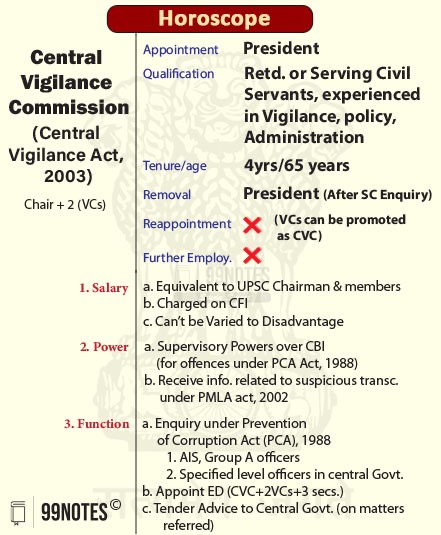
Functions of the CVC
- Exercises Superintendence over CBI in corruption cases: The Commission exercises superintendence over the functioning of the Delhi Special Police Establishment concerning offences alleged to have been committed under the Prevention of Corruption Act, 1988.
- Enquires or investigates on a reference made by the central government, wherein a public servant under central government or any authority under the central government has allegedly committed an offence under the Prevention of Corruption Act, 1988.
- Exercises superintendence over the vigilance administration of the various Ministries of the Central Government, along with corporations established by or under any Central Act, Government companies, local authorities and societies owned or controlled by the government.
- Reviews the progress of the investigation conducted by CBI into alleged offences committed under the Prevention of Corruption Act, 1988.
- Review the status of applications awaiting approval from the competent authorities for sanction of prosecution under the Prevention of Corruption Act, 1988.
- Tenders advice to the Central government, corporations and authorities owned or controlled by the central government referred to it by them.
- Concerning Whistle blower’s resolution: To conduct or commission an inquiry into complaints received under the Public Interest Disclosure and Protection of Informer’s (PIDPI) Resolution (2004); also known as Whistle blowers resolution and recommend suitable course of action.
- Consultation with Commission: The central government is required to consult the Central Vigilance Commission in making rules or regulations governing the vigilance or discipline concerning the persons employed under All India Services or central services.
- Authority under PMLA: The Commission has been assigned as the designated authority to receive information pertaining to suspicious transactions as per the Prevention of Money Laundering Act, 2002.
- Power of Civil Court: While conducting an inquiry, the Commission has the power of civil courts, and proceedings before the Commission are deemed to be judicial proceeding
- Power with respect to the appointment of Director of Enforcement: The CVC (as Chairperson), two VCs, along with the Secretaries of the Ministry of Home Affairs, Department of Personnel & Training and Department of Revenue in the Ministry of Finance, recommend the name of the person, to be appointed as Director of Enforcement by the central government.
- Annual Report: The Commission presents a performance report to the President on an annual basis, which is then laid before the Parliament.
| Amendments in the CVC Act and DPSE Act, under the Lokpal and Lokayuktas Act, 2013 |
|
| The Central Vigilance Commission (Amendment) Act, 2021 |
| The amendment act amended Section 25 of the CVC Act (regarding the appointment of the Director of Enforcement) to extend the tenure of the Director of Enforcement for one year at a time (maximum 3 times). |
Limitations of the CVC
- Executive control over appointment: Even though the selection panel for appointment of CVC and VCs also include the Leader of Opposition, the other 2 members (the PM and the Home Minister) are invariably from the central government. This may hamper its functioning as an autonomous body.
- It is an advisory body; the central government is not bound to act on the advice of the Commission.
- It does not have ample resources to address the volume of complaints it receives.
- It does not have the power to file criminal cases; its jurisdiction is limited to taking care of vigilance and disciplinary matters.
- The Commission does not have the authority to instruct the CBI to initiate an inquiry against the officers of joint secretary level and above without permission from the concerned department.
- Even though provided with supervisory authority over the CBI, it cannot ask the CBI for requisition of files or direct it to investigate certain cases.
| Whistle Blowers Protection Act, 2014 |
Background:
Provisions of the Act
|

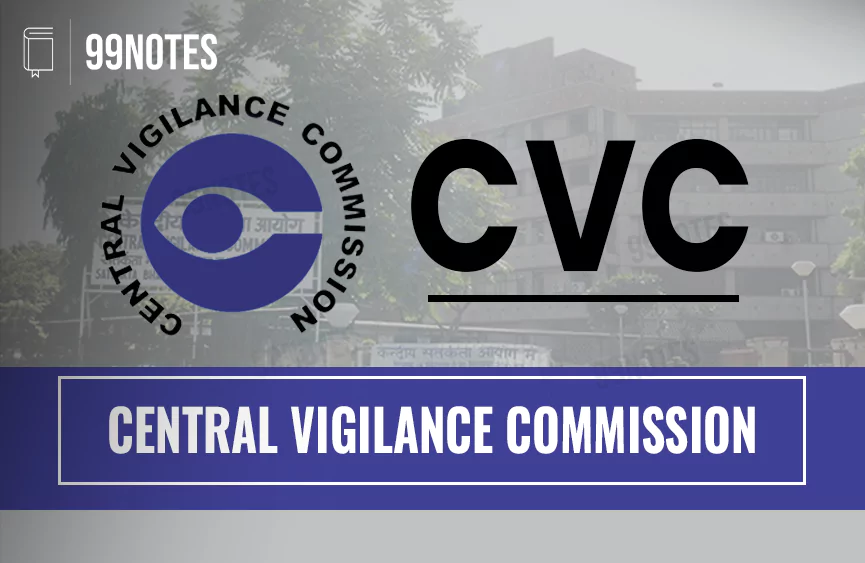

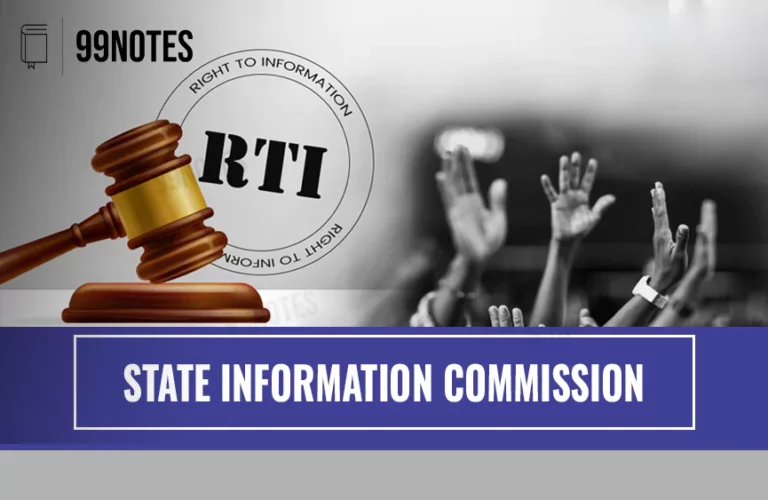
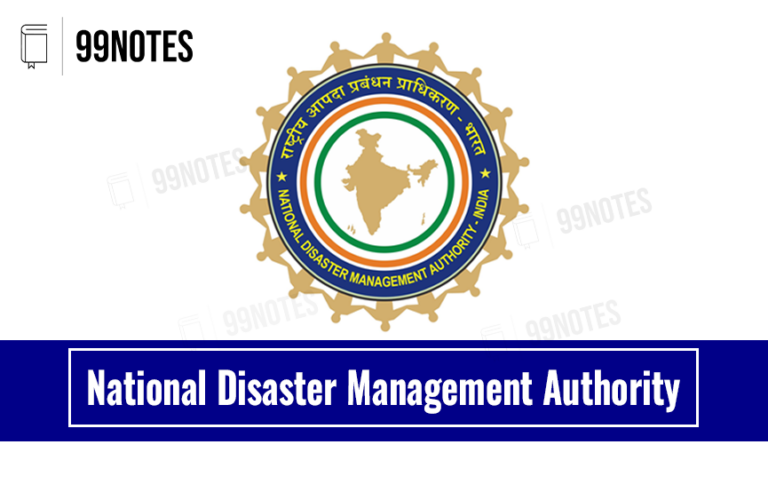
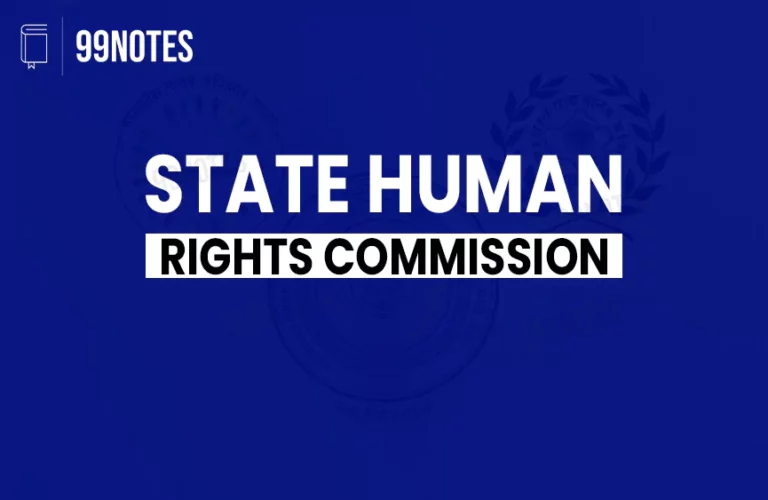
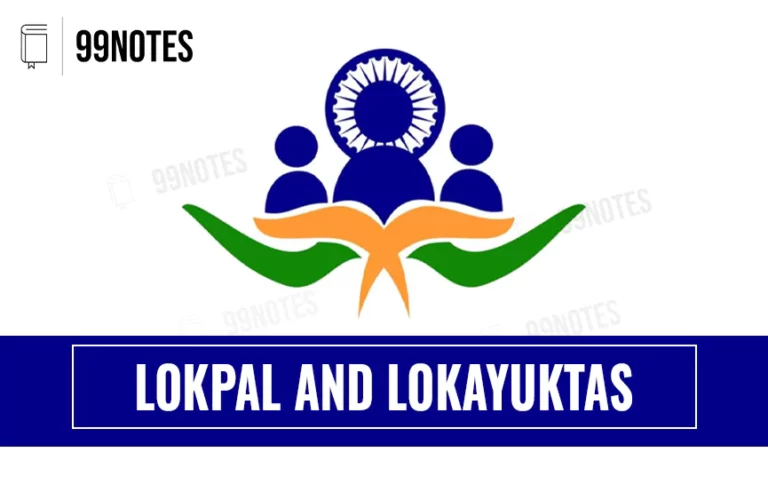
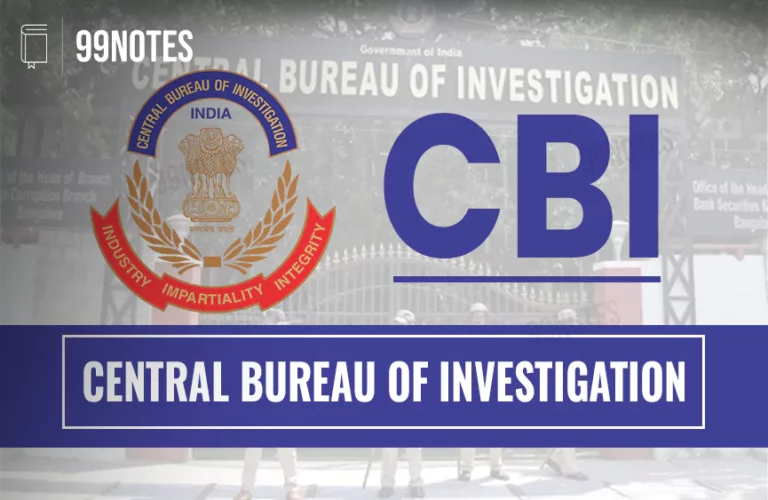
![National Human Rights Commission (Nhrc) [Upsc Notes] | Updated July 27, 2024 National Human Rights Commission (Nhrc) [Upsc Notes]](https://99notes.in/wp-content/uploads/2024/01/national-human-rights-commision-featured-667168d64d9c6-768x500.webp)